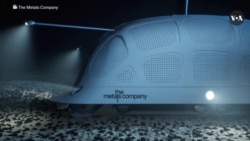Fueling the green energy transition: The debate over mining the seabed floor and whether it helps or hurts planet earth.
Welcome to VOA Asia Weekly. I'm Chris Casquejo in Washington. That story is coming up, but first, making headlines:
Taiwanese pager maker, Gold Apollo, says it licensed its brand to a company based in Hungary but strongly denied that it made the devices that wounded thousands of Hezbollah operatives in Lebanon when they exploded. Gold Apollo says they were manufactured by a company based in Budapest. The bold attack has raised the prospect of a full-scale war between the Iran-backed group and Israel.
Voters in India's Jammu and Kashmir cast ballots in the first of three phases of provincial polls on Wednesday. These are the first local elections since Kashmiris lost their semi-autonomy to India in 2019. The Himalayan region has grappled with years of militant violence. Jammu and Kashmir is India's only Muslim-majority territory and has been at the center of a dispute with neighboring Pakistan since 1947.
More than 17 million Sri Lankans will vote for a new president on September 21st, hoping to fight corruption and foster economic growth as the island nation recovers from its worst financial crisis in more than 70 years. Former president Gotabaya Rajapaksa was deposed in a popular uprising in 2022. His successor and current president, Ranil Wickremesinghe, is running third in current polls.
North Korea fired multiple short-range ballistic missiles on Wednesday, South Korea and Japan said. The launch comes just days after the North unveiled a uranium enrichment facility and vowed to beef up its nuclear arsenal.
Floods and landslides in Myanmar triggered by last week’s typhoon and seasonal monsoon rains have killed at least 226 people. State media reports that at least 77 people are still missing. The new figures push the total number of dead in Southeast Asia from the storm past 500, including almost 300 in Vietnam alone.
People from across the globe are convening on the sidelines of the U.N. General Assembly in New York City for Climate Week. On the agenda: the environmental impact of seabed mining. The discussion comes as tech companies seek ways to fuel the green revolution while minimizing environmental impacts. VOA’s Jessica Stone has more.
The global energy transition is powered by critical minerals: lithium…cobalt…manganese…nickel…and copper.
All of which the International Seabed Authority says are plentiful across the floor of the Pacific Ocean — formed into rocks more than four thousand meters under the sea.
The Pacific Island nations of Tonga, Kiribati and Nauru have partnered with Canadian deep-sea mining firm The Metals Company to explore harvesting "nodules" — or aggregates of minerals — in a deep part of the Pacific Ocean called the Clarion-Clipperton Zone.
Gerard Barron is CEO of The Metals Company.
“Our collector methodology is to put a robot on the seafloor which crawls along the ocean floor and fires a jet of water at the nodule, and it creates an inverse pressure and lifts the nodule up, and so we don’t go down and scour the seafloor.”
But critics like Greenpeace and Eddie Palu from the Tonga Fishery Association worry that harvesting these mineral-rich rocks will disrupt biodiversity. Palu wants to hold off on mining.
“We demand a moratorium on the seabed mining until the environment[al], social and economic risk are comprehensively understood.”
Some scientists have noted that with little oxygen and no light, life in the Clarion-Clipperton Zone is mostly limited to bacteria and small invertebrates, though the extent of the biodiversity is still unknown.
U.S.-based Impossible Metals is testing a robot that can avoid mineral deposits where it detects life and harvest those where it does not.
And Viridian Biometals bypasses energy-intensive processes such as smelting by using bacteria which can separate metal ore from the rock around it.
As these companies continue to innovate, they say they are committed to mitigating the environmental damage that comes from mining the seafloor and lowering the cost of the minerals that contribute to the green economy, all while combating climate change.
Jessica Stone, VOA News.
Visit voanews.com for the most up-to-date stories.
I’m Chris Casquejo.
Finally, Hong Kong authorities staged a nighttime show over Victoria Harbour featuring hundreds of drones in various colors. The display celebrates the mid-Autumn Festival, a big holiday on the lunar calendar throughout East Asia.
Drone shows are the new fireworks. In China, images of rabbits and mooncakes are closely associated with this festival.
Thanks for watching VOA Asia Weekly.











